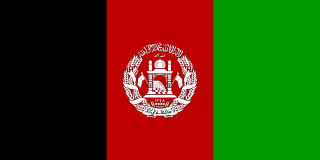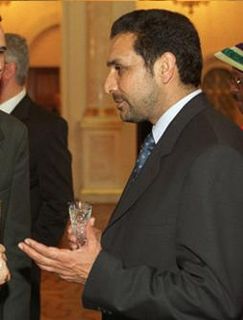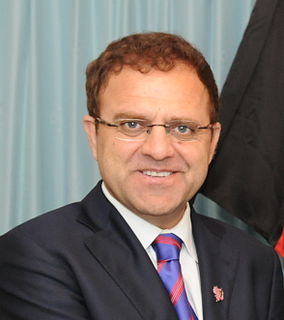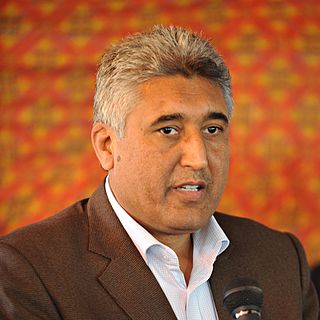
Hamid Karzai is an Afghan politician who was the President of Afghanistan from 22 December 2001 to 29 September 2014, originally as an interim leader and then as President for almost ten years, from 7 December 2004 to 2014. He comes from a politically active family; Karzai's father, uncle and grandfather were all active in Afghan politics and government. Karzai and his father before him, Abdul Ahad Karzai, were each head of the Popalzai tribe of the Durrani tribal confederation.
Mohammad Qasim Fahim, also known as "Marshal Fahim"; 1957 – 9 March 2014) was a politician in Afghanistan who served as Vice President from June 2002 until December 2004 and from November 2009 until his death. Between September 2001 and December 2004, he also served as Defense Minister under the Afghan Transitional Administration.

Ashraf Ghani Ahmadzai is an Afghan politician current President of Afghanistan, elected on 21 September 2014. An anthropologist by education, he previously served as finance minister and the chancellor of Kabul University.

The Transitional Islamic State of Afghanistan (TISA), also known as the Afghan Transitional Authority, was the name of a temporary administration of Afghanistan put in place by the loya jirga of June 2002. It succeeded the original Islamic State of Afghanistan and preceded the current Islamic Republic of Afghanistan.

Ahmad Zia Massoud was the Vice President of Afghanistan in the first elected administration of President Hamid Karzai, from December 2004 to November 2009. He is a younger brother of the late Ahmad Shah Massoud, the resistance leader against the Soviet invasion of Afghanistan and against the Taliban. In late 2011, Ahmad Zia Massoud joined hands with major leaders in the National Front of Afghanistan, which strongly opposes a return of the Taliban to power. The National Front is generally regarded as a reformation of the United Front which with U.S. air support removed the Taliban from power in late 2001.
Taj Mohammad Wardak is an Afghan politician, from the Pashtun ethnic group. He spent some of the period of the Taliban's administration in the United States of America, and became an American citizen.
The following lists events that happened during 2002 in Afghanistan.

Mohammad Haneef Atmar is the former Interior Minister of Afghanistan. He was removed from MOI by Hamid Karzai in the wake of attacks on the June 2010 Afghan Peace Jirga. Before that he worked with several international humanitarian organizations and served as Minister of Rural Rehabilitation and Development and Minister of Education. In 2011, he is part of the Right and Justice party. During his time in office, he has visited several countries to get funding to stabilize Afghanistan. Atmar was serving as National Security Advisor to Ashraf Ghani the President of Afghanistan. He resigned from his post as there was disagreement with Ghani on certain issues. In late 2018, Atmar announced his candidacy for the April 2019 presidential elections, indicating he firmly believes a peace deal with the Taliban is possible.
Mohammad Yousef Pashtun is an Afghan Technocrat and Politician, serving as the Senior Adviser to the President of Afghanistan on Construction, Mines, Water & Energy. He previously served as Minister of Urban Development and Housing for two terms and Governor of Kandahar province, in 2003 replacing Gul Agha Sherzai under President Hamid Karzai administration. In 2010, he was appointed as Senior Adviser to President Karzai on Construction, Mines, Water & Energy. Minister Pashtun continued to serve as Senior Adviser to newly elected President, Ashraf Ghani.
Engineer Abdul Rahim was appointed the Afghan Communications Minister of the Afghan Interim Administration—the first post-Taliban government in 2002. Abdul Rahim was from the Tajik ethnic group.

Omar Zakhilwal is a politician in Afghanistan, is the current Afghanistan ambassador to Pakistan and served as the Finance Minister and Chief Economic Advisor to the President Hamid Karzai. He is also the president of the Afghanistan Cricket Board.

Mohammad Asif Rahimi is an ethnic Tajik politician born and raised in Paghman District, Kabul in Afghanistan, currently serving as Minister of Agriculture. An ethnic Tajik, he was born in 1959 and raised in Kabul, and obtained a bachelor degree from Kabul University in 1981 before completing post-graduate studies in Management of Development Programs in 1989 at Omaha University in Nebraska, United States. Rahimi moved to Canada in 2001, and returned to Afghanistan in 2005, where he joined the Ministry of Rural Rehabilitation and Development, spearheading rural development and infrastructure regeneration. He was appointed to his current posting in October 2008 and was confirmed by the National Assembly of Afghanistan. Part of his Ministry's efforts have been focused on reducing opium production in Afghanistan, which is seen as critical to Afghanistan's development.

The Karzai administration was the government of Afghanistan under President Hamid Karzai, who became the head of state of Afghanistan in December 2001 after the Taliban government was overthrown. Karzai was appointed at the 2002 Loya Jirga as the Interim President of the Afghan Transitional Administration. After the 2004 Afghan presidential election, he became the President of Afghanistan.

Muhammad Yunus Nawandish was the Mayor of Kabul from after his appointment by Afghan President Hamid Karzai in January 2010. During his time in office the Mayor initiated an aggressive program of municipal improvements in streets, parks, greenery, revenue collection, environmental control, and solid waste management.

Zalmai Rassoul is an Afghan politician who served as Foreign Minister of Afghanistan from January 2010 to October 2013. He previously served as National Security Advisor beginning in June 2002. He has accompanied Afghan President Hamid Karzai on all official visits since the establishment of the Interim Administration in 2001. He resigned as Foreign Minister on 5 October 2013 to stand as a candidate in the 2014 presidential election.
2003 in Afghanistan. A list of notable incidents in Afghanistan during 2003
Noor Mohammad Qarqin, born 1953 in a village in Qarqeen District of Jowzjan Province, is a former Afghan government minister and ambassador. He is an ethnic Turkman and has an Bachelor of Science from Kabul University.
Engineer Najibullah Awzhang is a former Afghan Minister of Public Works.
Wais Ahmad Barmak is a politician in Afghanistan. He is a former Minister of Interior. Prior to that, he served as Minister for Disaster Management and Humanitarian Affairs of Afghanistan and as Minister of Rural Rehabilitation and Development.
Nasir Ahmad Durrani is an Afghan politician who is also the current Minister of Agriculture, Irrigation & Livestock. He was appointed as the acting minister of Agriculture by the President in September 2017, he assumed the position officially when he received a vote of confidence from the Afghan Parliament in December 2017. Nasir Ahmad Durrani has held various government positions since 2010.













